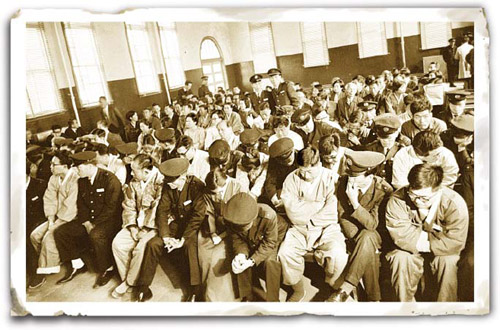
From Chapter 8: “Kafka would have cried: The East Berlin Incident”
Early on June 17, 1967, in West Germany, an official telephoned well-known Korean composer Isang Yun at his home in West Berlin and asked him to visit the South Korean embassy. Yun travelled to Bonn, and once he was inside the embassy, officials grabbed him, stuck him in an attic, and for two days accused him of being a spy for North Korea. The composer denied the charges, but officials trans-ported him to a Hamburg airport and slipped him onto a Japanese Air-lines plane bound for Seoul — even though he had no passport or plane ticket.
Meanwhile, in Heidelberg, rumours of missing South Koreans trickled into a German police station after a letter arrived from a stu-dent studying at the University of Heidelberg. The letter explained that the student had found himself “in the situation of K,” the man in Franz Kafka’s The Trial, a book that follows a man who is arrested and tried in court but never finds out the reasons why. When Korean agents arrived to detain the student, he tried to escape and discovered that they knew Tae Kwon Do, judging by the way they roughed him up. By this time, Choi’s brand of Tae Kwon Do was well known in West Germany and had spread to thirty countries. The agents hus-tled the student onto a plane and deposited him in Seoul, where South Korea put him on trial on trumped-up charges of treason.
In West Germany, officials heard more stories: a Korean student in Heidelberg was invited to dinner and kidnapped; a lecturer vanished from a Frankfurt university; a doctor, painter, poet, and several news-paper reporters had gone missing — all of them Korean-Germans. In total, more than forty-five Koreans were missing from Germany, eight from France, and 143 from Austria, the U.S., the U.K., Australia, and South Korea.
What was going on?
A Korean spy chief in Germany knew. Yang Doo-wan was hiding undercover as an embassy official and leading the German part of an operation to arrest students and artists that the South Korean dictator-ship disliked. To help with the operation, he imported fifty extra agents and recruited Korean Tae Kwon Do instructors and Korean miners. The miners had been introducing Tae Kwon Do to Europe since 1963.
This was the turbulent 1960s: anti–Vietnam War students were demonstrating, the Cold War was peaking, and the KCIA had made up allegations that students in Europe were moonlighting as North Korean spies.189 The KCIA flew the abductees from Germany to South Korea, where agents deposited them in Namsan, a wooded hill in the centre of Seoul that contained the KCIA’s headquarters, the basement of which was equipped with torture devices.
Choi eventually discovered that two of his men were involved in the mass abductions. During the week of the kidnappings, thirty-one-year-old Kim Kwang-il, a KCIA operative and Tae Kwon Do pioneer and instructor who had lived in Stuttgart for many years, had travelled 600 miles from city to city, showing Korean officials where students lived. Lee Gye-hoon, a second Tae Kwon Do pioneer who was in-volved, was a KCIA agent at the end of 1966 and an executive of Choi’s International Taekwon-Do Federation.
In Dusseldorf, West Germany, one student managed to escape on the way to the airport and stumble into a police station, where he filed a desperate report. The German police were baffled. Mass kidnap-pings? Women luring students to abductions? Martial artists forcing people into cars? The police were not aware that the German and American secret services had allowed the Koreans to carry out the mission. However, escapees and media coverage forced Germany to issue an official protest, calling the operation “a grave breach of inter-national law” and offering police protection to the remaining 4,200 South Koreans in the country.
The kidnappings were dubbed the East Berlin Incident because the South Korean government had made up lies about students visiting North Korean agents for espionage training in East Berlin, which was communist at the time. As news of the international scandal spread around the world, South Korean dictator Park Chung-hee faced a bar-rage of criticism, and he was livid; the KCIA was supposed to quietly “encourage” suspected communists to fly to Seoul, but the world now saw thuggishness usually only associated with North Korea. As the scandal grew, Germany expelled three South Korean diplomats and suspended aid to South Korea. Police arrested a Korean miner and Tae Kwon Do instructor Kim Kwang-il, and France formally protest-ed to South Korea, where an uproar had begun, partly because of the kidnapping of composer Isang Yun…

